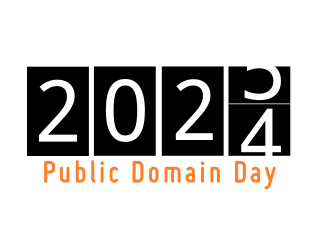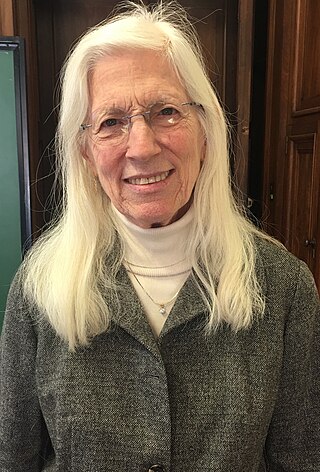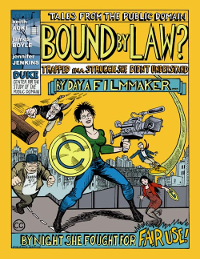
A copyright is a type of intellectual property that gives its owner the exclusive legal right to copy, distribute, adapt, display, and perform a creative work, usually for a limited time. The creative work may be in a literary, artistic, educational, or musical form. Copyright is intended to protect the original expression of an idea in the form of a creative work, but not the idea itself. A copyright is subject to limitations based on public interest considerations, such as the fair use doctrine in the United States and fair dealings doctrine in the United Kingdom.

Criticism of copyright, or anti-copyright sentiment, is a dissenting view of the current state of copyright law or copyright as a concept. Critics often discuss philosophical, economical, or social rationales of such laws and the laws' implementations, the benefits of which they claim do not justify the policy's costs to society. They advocate for changing the current system, though different groups have different ideas of what that change should be. Some call for remission of the policies to a previous state—copyright once covered few categories of things and had shorter term limits—or they may seek to expand concepts like fair use that allow permissionless copying. Others seek the abolition of copyright itself.
Libertarians have differing opinions on the validity of intellectual property.
Perpetual copyright, also known as indefinite copyright, is copyright that lasts indefinitely. Perpetual copyright arises either when a copyright has no finite term from outset, or when a copyright's original finite term is perpetually extended. The first of these two scenarios is highly uncommon, as the current laws of all countries with copyright statutes set a standard limit on the duration, based either on the date of creation/publication, or on the date of the creator's death. Exceptions have sometimes been made, however, for unpublished works. Usually, special legislation is required, granting a perpetual copyright to a specific work.
The threshold of originality is a concept in copyright law that is used to assess whether a particular work can be copyrighted. It is used to distinguish works that are sufficiently original to warrant copyright protection from those that are not. In this context, "originality" refers to "coming from someone as the originator/author", rather than "never having occurred or existed before".
Golan v. Holder, 565 U.S. 302 (2012), was a US Supreme Court case that dealt with copyright and the public domain. It held that the "limited time" language of the United States Constitution's Copyright Clause does not preclude the extension of copyright protections to works previously in the public domain.
The Adelphi Charter on Creativity, Innovation and Intellectual Property is the result of a project commissioned by the Royal Society for the encouragement of Arts, Manufactures & Commerce, London, England, and is intended as a positive statement of what good intellectual property policy is. The Charter was issued in 2004.
Cultural environmentalism is the movement that seeks to protect the public domain. The term was coined by James Boyle, professor at Duke University and contributor to the Financial Times.

Public Domain Day (PDD) is an observance of when copyrights expire and works enter into the public domain. This legal transition of copyright works into the public domain usually happens every year on January 1 based on the individual copyright laws of each country.

Margaret Jane Radin is the Henry King Ransom Professor of Law, emerita, at the University of Michigan Law School by vocation, and a flutist by avocation. Radin has held law faculty positions at University of Toronto, University of Michigan, Stanford University, University of Southern California, and University of Oregon, and has been a faculty visitor at Harvard University, Princeton University, University of California at Berkeley, and New York University. Radin's best known scholarly work explores the basis and limits of property rights and contractual obligation. She has also contributed significantly to feminist legal theory, legal and political philosophy, and the evolution of law in the digital world. At the same time, she has continued to perform and study music.
The philosophy of copyright considers philosophical issues linked to copyright policy, and other jurisprudential problems that arise in legal systems' interpretation and application of copyright law.

The public domain (PD) consists of all the creative work to which no exclusive intellectual property rights apply. Those rights may have expired, been forfeited, expressly waived, or may be inapplicable. Because no one holds the exclusive rights, anyone can legally use or reference those works without permission.

Brian Fitzgerald is an Australian legal academic and barrister. He is an intellectual property and information technology/internet lawyer who has pioneered the teaching of internet/cyber law in Australia. Fitzgerald was a specialist research professor at the Queensland University of Technology (QUT) until February 2012, when he became the inaugural executive dean of law at the Australian Catholic University's Faculty of Law and Business.
The copyright term is the length of time copyright subsists in a work before it passes into the public domain. In most of the world, this length of time is the life of the author plus either 50 or 70 years.

Freedom of Expression® is a book written by Kembrew McLeod about freedom of speech issues involving concepts of intellectual property. The book was first published in 2005 by Doubleday as Freedom of Expression®: Overzealous Copyright Bozos and Other Enemies of Creativity, and in 2007 by University of Minnesota Press as Freedom of Expression®: Resistance and Repression in the Age of Intellectual Property. The paperback edition includes a foreword by Lawrence Lessig. The author recounts a history of the use of counter-cultural artistry, illegal art, and the use of copyrighted works in art as a form of fair use and creative expression. The book encourages the reader to continue such uses in art and other forms of creative expression.
The Center for the Public Domain was a charitable foundation created in 1999 by Bob Young as the Red Hat Center for Open Source. Until 2002, it provided free online legal resources, sponsored public domain spaces on the Internet, and campaigned for copyright reforms.
A free license or open license is a license that allows copyrighted work to be reused, modified, and redistributed. These uses are normally prohibited by copyright, patent or other Intellectual property (IP) laws. The term broadly covers free content licenses and open-source licenses, also known as free software licenses.

Bound by Law?: Tales from the Public Domain is a comic book about intellectual property law and the public domain published in 2008 by Duke University Press. Written by Keith Aoki, James Boyle and Jennifer Jenkins and supported by the Center for the Study of the Public Domain at the Duke Law School, the book was first released in a free digital edition under a Creative Commons license in 2006. The 2008 edition has an introduction by Cory Doctorow and a foreword by Davis Guggenheim.

Ruth Lade Okediji is an American legal scholar. She is the Jeremiah Smith. Jr, Professor of Law at Harvard Law School and co-director of the Berkman Klein Center. She also founded and serves as faculty director of Harvard Law School's Program on Biblical Law and Christian Legal Studies. Professor Okediji is an internationally renowned expert and scholar on intellectual property, trade and development. In 2017 she was appointed as part of the Creative Commons Board.
The labor theory of copyright, also known as the natural rights theory, is one of the most prominent theories of copyright, among others like the personality theory and the incentive/welfare theory. According to the labor theory, an individual has a right to the product of their labor, whether physical or intellectual. It is based on the John Locke's labor theory of property which says that persons are entitled to the fruits of their own labor, and by extension, intellectual property can be viewed as the fruits of an individual's mental labor. While the Lockean theory was originally intended for conventional forms of property, it can be extended to justify intellectual property in general and copyright in particular if we view an owner's claim to traditional forms of property as being analogous to an author's claims over their intellectual property.









